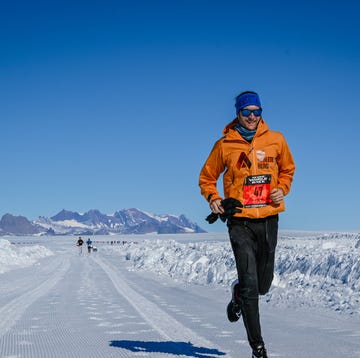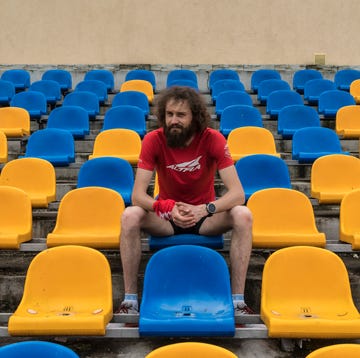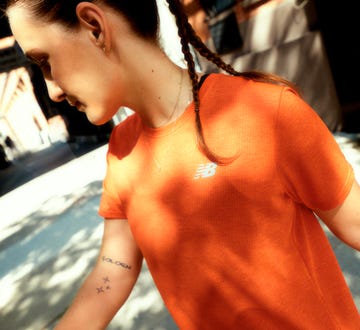Years ago, Emily Durgin’s college coach paid her a compliment that stuck with her. J.J. Clark, legendary coach of middle-distance Olympians Jearl Miles-Clark, Hazel Clark, and Joetta Clark Diggs, told Durgin she has the “crazy gene.”
“He said, ‘All great athletes have it,’” Durgin, 28, told Runner's World. “People think I'm crazy, but I really just love what I do. I love pushing myself. I love to work hard. I never get scared of that.”
Despite a lack of sponsor interest early on, Durgin’s drive helped her rise from being an above average college runner to one of the fastest U.S. half marathoners in history. Now she’s preparing for the biggest test yet—her first 26.2 at the New York City Marathon on November 6.
Learning to advocate for herself
While Durgin grew up in Portland, Maine, that crazy gene started to materialize in middle school when she joined the track and cross-country team. “Every time I lined up to a start line, I just knew that I was the best,” she said. “But with a lot of runners who start young, you kind of ebb and flow through that.”
When Durgin, 28, attended the University of Connecticut, that confidence wavered a bit with the higher level of competition, she said. She came to UConn as a three-time state champion and Foot Locker finalist, but she was one of many high caliber athletes vying for podium spots at the Division I level. Still, Durgin managed to notch personal bests of 16:00 in the 5,000 meters and 33:49 in the 10,000 meters, respectable times but not fast enough to be considered for a brand endorsement.
By the time she graduated in 2017, her confidence had returned. She believed that even with no sponsor interest, she could make it as a professional runner if she stuck with it. “It goes back to that crazy gene and knowing how good I could be,” she said.
Through a friend, Durgin connected with Mark Coogan, coach of the New Balance Boston group that includes the American record-holder Health - Injuries and Olympian Heather MacLean. Durgin said she presented him with a cover letter and resume while pitching him on why she would be a good fit for his team of elite runners. In the end, New Balance didn't offer her a professional contract, but she received free coaching, gear, and access to the team's facilities. To make ends meet, Durgin worked as a nanny in Boston, earning around $260 a week while balancing training for over a year.
Her times started getting faster. At the Payton Jordan Invitational, she ran 32:59, improving her 10,000-meter personal best by nearly a minute.
Regaining her competitive edge
In 2019, Durgin's commitment paid off when she signed her first professional contract with Under Armour. She moved to Flagstaff, Arizona with the goal of proving herself on the roads and the track. But that goal came with added pressure, she said. “It caused me to lose that edge that I had before,” she recalled. “I was doing it more for myself and then I felt like now I'm doing this to prove to my coach, agent, and brand that I'm worthy of this.”
At first, Durgin also struggled to find a sense of belonging in the high altitude running hub, where she didn't know many people. But in 2020, race cancellations caused by the pandemic allowed Durgin to hit reset. She stepped away from a strict training regimen and returned to racing on her own terms.
“I've had some lows in the sport that I think all athletes in every sport probably experience, but if you're able to come back to that inner child self that has that confidence, knowing you can compete with anyone, I think it's a really good trait to have,” Durgin said.
For the last year and a half, she's run as an Adidas athlete and been coached by Terrence Mahon, He said, All great athletes have it, Durgin, 28, told Deena Kastor, We may earn commission from links on this page, but we only recommend products we back Runner’s World he sees similarities in the two runners’ personalities: “super friendly, wants to help everybody, but you put her out there on the race course, and she’s just a different animal,” he said.
Mahon recalled a recent workout where the goal was to have Durgin start slower than marathon pace and get faster for each mile. Instead, she kicked off the progression run with a 5:13 uphill mile at altitude and maintained 5:20-mile pace for the 6-mile run. “That would blow up most people, but Emily settled back in and found her pace,” Mahon said, explaining that Kastor would pull similar stunts in workouts because she never wanted to lose.
Mahon lives in San Diego, California but visits Flagstaff throughout the year for training camps. Durgin also goes to San Diego for training stints. Most of the work is done remotely, but Durgin is far from alone in her efforts since building friendships within the large community of elite runners that live in Flagstaff. She counts 2020 Olympic Marathon Trials champion Aliphine Tuliamuk and Olympic bronze medalist Molly Seidel as mentors. Fellow elite marathoner Sarah Pagano, who is also coached by Mahon, also trains with Durgin when she visits Flagstaff.
Taking a long-term approach
With her confidence back up, Durgin has seen a number of breakthroughs this year. In January, the momentum continued at the Houston Half Marathon, where she finished sixth in 1:07:54 and became the during a workout. On the USATF road running circuit, she placed second at the 15K championships and third at the 10-mile championships. She also earned another personal best in the 10,000 meters (31:33) at The Track Meet in May.
For the New York City Marathon, Durgin and Mahon worked on a 10-week training buildup with a focus on progression runs and effort-based workouts to simulate the hills and tactical nature of the course. For her first marathon training cycle, they didn't change too much outside of stretching out her long runs and the length of a few key workouts. So far, her longest run has been 24 miles. For the most part, she's been averaging 90 miles each week with one 100-mile week. Because she’s been a lower mileage athlete for a big chunk of her career, Mahon wanted to put the focus on quality over quantity for this initial training cycle.
“My goal with any first-time marathoner is to make you not hate the event when you finish,” Mahon said, while explaining that he hopes Durgin remains patient with a long-term approach because he sees great potential for her down the line.
“Knock on wood, if we get everything going and she likes it, she'll definitely be a sub-2:20 marathoner,” he said.
So far, Durgin’s biggest challenge has been managing her anxiety around staying healthy and not overdoing it with training, she said. To help ease her anxiety, Durgin started wearing an Oura ring to track her heart rate and recovery after workouts, which has helped her make more informed decisions about her body. While the marathon can be daunting, Durgin also has a sense of humor as a newcomer to the event. On Instagram, she posted a video of a during a workout during a workout.
“I know one or two things are going to go wrong, which I'm mentally prepared for, but my goal is to just have a good experience,” Durgin said. “Performance-wise, I want to beat as many people as possible.”
During the race on Sunday, Durgin aims to compete up front with the American elite field, which includes D'Amato, Tuliamuk, world championship finalist Emma Bates, 2018 Boston Marathon champion Des Linden, Nell Rojas, and Steph Bruce. With the high level of competition in New York City, that could also translate to a top 10 finish, another aggressive goal that Durgin isn’t afraid to chase.
Taylor Dutch is a writer and editor living in Austin, Texas, and a former NCAA track athlete who specializes in fitness, wellness, and endurance sports coverage. Her work has appeared in Runner’s World, SELF, Bicycling, Outside, and Podium Runner.














